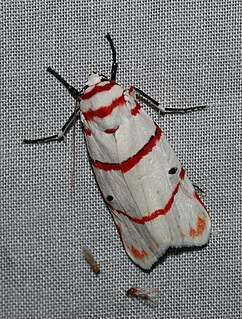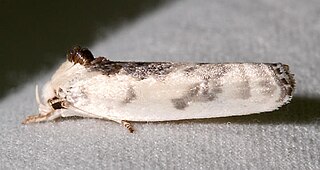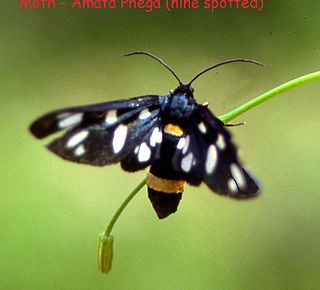Related Research Articles

Spilomelinae is a very species-rich subfamily of the lepidopteran family Crambidae, the crambid snout moths. With 4,132 described species in 340 genera worldwide, it is the most speciose group among pyraloids.

Hypena is a genus of moths in the family Erebidae. It was first described by Franz von Paula Schrank in 1802. These non-migratory moths overwinter as pupae and almost never come to bait as adults.

Omiodes is a moth genus in the family Crambidae. Several species are endemic to Hawaii.

Cisthene is a genus of lichen moths in the family Erebidae. The genus was erected by Francis Walker in 1854.

Cosmosoma is a genus of tiger moths in the subfamily Arctiinae. The genus was erected by Jacob Hübner in 1823.

Ctenucha is a genus of moths in the family Erebidae.

Cyana is a genus of moths in the family Erebidae. Species are well distributed in Africa, Madagascar, China, India, Sri Lanka, Myanmar, Sumatra, Java and Borneo. The genus was erected by Francis Walker in 1854.
Eressa is a genus of moths in the family Erebidae. The genus was erected by Francis Walker in 1854.

The Aganainae are a small subfamily of moths in the family Erebidae. The adults and caterpillars of this subfamily are typically large and brightly colored, like the related tiger moths. Many of the caterpillars feed on poisonous host plants and acquire toxic cardenolides that make them unpleasant to predators. Like the closely related litter moths, the adults have long, upturned labial palps, and the caterpillars have fully or mostly developed prolegs on the abdomen. The Aganainae are distributed across the tropics and subtropics of the Old World.

Telioneura is a genus of moths in the subfamily Arctiinae. The genus was described by Felder in 1874.

Virbia is a genus of tiger moths in the family Erebidae. The genus was erected by Francis Walker in 1854.

Antaeotricha is a genus of moths. It is the largest genus in the subfamily Stenomatinae, numbering over 400 species in the Western Hemisphere.
Telioneura approximans is a moth in the subfamily Arctiinae. It was described by Rothschild in 1922. It is found in Peru.
Telioneura ateucer is a moth in the subfamily Arctiinae. It was described by Harrison Gray Dyar Jr. in 1914. It is found in Panama.
Telioneura brevipennis is a moth in the subfamily Arctiinae. It was described by Arthur Gardiner Butler in 1877. It is found in the Amazon region.
Telioneura fuliginosa is a moth in the subfamily Arctiinae. It was described by Rothschild in 1910. It is found in the Amazon region.

Telioneura glaucopis is a moth in the subfamily Arctiinae. It was described by Felder in 1869. It is found in the Amazon region.
Telioneura obsoleta is a moth in the subfamily Arctiinae. It was described by Max Wilhelm Karl Draudt in 1915.

The Syntomini are a tribe of moths in the family Erebidae. The tribe was erected by Gottlieb August Wilhelm Herrich-Schäffer in 1846.

Margaroniini is a tribe of the species-rich subfamily Spilomelinae in the pyraloid moth family Crambidae. The tribe was erected by Charles Swinhoe and Everard Charles Cotes in 1889.
References
- ↑ Savela, Markku. "Telioneura subplena (Walker, 1854)". Lepidoptera and Some Other Life Forms. Retrieved February 8, 2018.
- Pitkin, Brian & Jenkins, Paul. "Search results Family: Arctiidae". Butterflies and Moths of the World. Natural History Museum, London.
| This Arctiinae-related article is a stub. You can help Wikipedia by expanding it. |